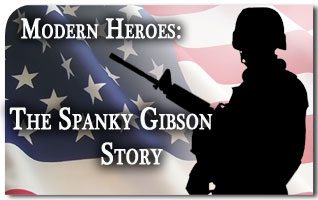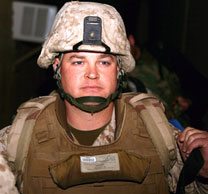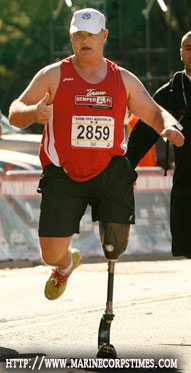 When Michael Monsoor jumped on a grenade to save the lives of three Navy Seals in September of 2006, the nation was left speechless. The Medal of Honor was presented to his grieving parents, during a White House reception, as a mournful audience looked on. There was a man in the room that day that might have seemed like just another soldier, if not for the peculiar spring in his step.
When Michael Monsoor jumped on a grenade to save the lives of three Navy Seals in September of 2006, the nation was left speechless. The Medal of Honor was presented to his grieving parents, during a White House reception, as a mournful audience looked on. There was a man in the room that day that might have seemed like just another soldier, if not for the peculiar spring in his step.
His name is William “Spanky” Gibson. He had just flown in from overseas and had a good reason for being present at the ceremony. He lost his left leg during a firefight in Iraq six months before and it was Michael Monsoor who provided cover in a rooftop overlook that contributed toward saving his life. It would be hard to find someone more worthy of that sacrifice than William Gibson. Like Petty Officer Monsoor, he is a tribute to the American soldier and his story deserves to be told.

Idealistic Youth
William Gibson acquired the nickname “Spanky” in boot camp. Although it had nothing to do with his likeness to the roundfaced kid in “The Little Rascals” series, he does radiate much of the innocent charm of that little boy.
By the time “Spanky” was only five years old, his father, William Sr., said he knew exactly what he wanted to be in life.
“When I grow up,” he said, “I am going to be just like grandpa.”
His grandfather, Peterson Parrott, a 30-year Marine, visited his impressionable grandson on a stopover while transferring from the East to the West coast. When Spanky saw his grandfather in uniform with all his decorations, he was fascinated. During his stay, Mr. Parrott kept his medals on a high shelf out of reach of the idealistic youth but made him a promise.
“When you grow tall enough to reach those medals,” Mr. Parrott said, “You can have them.”
By the time he grew tall enough, he had already joined the Marines and was well on his way to earning his own medals for bravery.
“[A soldier is] all he ever wanted to be,” said his father.
Firefight in Ramadi
Shortly after joining the Marine Corps, he earned the rank of gunnery seargent. In May of 2006, he was leading a four-man team through the streets of Ramadi, Iraq on a foot patrol. They were searching for the notorious Abu Musab al-Zarqawi in the most dangerous city on earth.
Alongside him was an Iraqi soldier; a man he helped train.
Suddenly they came under fire from a sniper in a nearby house. The Iraqi soldier was shot in the knee and incapacitated. With total disregard for his own safety, Sgt. Gibson ran to his rescue when a 30-caliber round ripped through his left knee cap, destroying the socket and severing his femoral artery.
The identical nature of the injuries, coming from a trained enemy marksman might have been an intentional plan to increase the confusion of already violent firefight. If they thought Sgt. Gibson would just lie there screaming in pain before being finished off later, they were sorely mistaken.
“Gunny” Gibson, as his men often called him, never missed a beat. Thinking that his knee had only given out, he attempted to stand before realizing the severity of his injury. Not allowing this to deter him, he simply rolled over and began returning fire. If not for the immediate assistance given to him by a SEAL corpsman, he would have bled to death on the battlefield. As he was dragged from the scene, he continued to lay down suppressive fire in spite of the pain and massive loss of blood.
“When Can I Return to Iraq?”
Sgt. Gibson was eventually flown back to the United States and waiting for him at the airport was Gen. Michael Hagee, the Commandant of the Marine Corps. Without a trace of self pity, Sgt Gibson asked the Commandant a curious question.
“What will this do to my career?”
The Commandant assured him that it would affect his career only to the degree that he allowed it to do so. This was a veritable invitation for Sgt. Gibson to fight as hard towards full rehabilitation as he fought on the streets of Ramadi. The fight began when he was encouraged to get out of the Marine Corps. Undeterred by the suggestion, William Gibson called the Commandant directly and found the support he needed to remain.
What Sgt. Gibson faced later is truly inspiring. The lower part of his left leg had been amputated overseas before he arrived at Bethesda Naval Hospital in Maryland. In spite of the seriousness of his injury, he mystified those around him with the constant inquiry: “When can I return to Iraq?” Those witnessing such determination were shocked, considering he might lose the rest of his leg. They were wondering how he would adjust to a life with a prosthetic while Sgt. Gibson was thinking about fighting a war with one.
“I would beg the surgeons every time they would come in,” he said with a smile, “to cut it off, close me up and get me out of here.”1
He knew that “out of here” meant one step closer to his goal of returning to combat with or without the remaining part of his left leg. The surgeons were unsuccessful. Sgt. Gibson ended up losing the rest of his leg, but he never lost his will to fight.
“It isn’t growing back” he was quoted as saying, “so let’s start recovering.”2
As unbelievable as this might be, Sgt. Gibsons attitude towards a long recovery was even more so.
“What is the shortest time of anyone recovering from such an injury?” his wife Chaney remembered him asking the doctors. He was told that the quickest anyone made it through rehab was thirteen months, but some were as long as eighteen to twenty four months.
“I am not doing that,” was Sgt. Gibson defiant response.

Escape from Alcatraz
He then began an astonishing rehabilitation program. Two months after his injury he stopped taking all his medicine including that for pain so as to be clearheaded and focused. Shortly after that, he began taking his first steps on a new prosthetic leg with the help of crutches. Three months later, he participated in the Marine Corps Marathon on a hand bike, then it was on to skiing and later ice climbing.
It wasn’t long before he tackled something which even a man with two legs would hesitate attempting and that was the Escape from Alcatraz Triathlon. This would turn out to be the break he needed to return to Iraq.
The Triathlon is a yearly event in which swimmers are dropped on the island in the San Francisco Bay where the famous prison is located. The first part of the Triathlon entails swimming to shore in freezing cold, shark-infested waters. Sgt. Gibson made the swim with only one leg and came in among the top ten.
When he reached the shore he was greeted by the 1st Marine Expeditionary Force Commanding General James Mattis.
“What can I do for you, Marine?” Gen. Mattis asked the winded but determined soldier.
“I want to be re-deployed,” said Sgt. Gibson.
“You can come with me in January,” Gen. Mattis said, “or a later flight, which would you prefer?”
Sgt. Gibson chose the first flight out and after making the trip in January of 2008 with General James Mattis, he has become the first full leg amputee ever to return to duty in a combat zone.
“I Have Just Done My Job”
Although what he has done is extraordinary, his mother says her son wouldn’t agree.
“He doesn’t feel like he has done anything special,” she says. In the face of a writer who approached the family with the idea of writing a book about Sgt. Gibson, his mother says his attitude remained the same. “Why would anyone want to read about me,” he argues, “I have just done my job?”
Perhaps the most amazing thing about William Gibson is his refusal to allow the loss of a leg to get him down. This no doubt is a character trait he inherited from his father; a Vietnam veteran who suffered a broken back in combat. When doctors told William Sr. that he would never walk again he proved them wrong. “You never say can’t,” Mr. Gibson said. “It might be difficult, but you can do it.”
The only moment of sadness for Sgt. Gibson came with the thought of having to leave the battlefield after his injury.
Chaney Gibson described her husband as someone who leads by example. “He would never put one of his Marines out there alone to get hurt,” she said. “He felt like he had to protect them.”
At the time he was wounded, Sgt. Gibson was a 35-year-old veteran Marine, fighting alongside much younger Marines who were seeing their first action. He believed strongly in leading his men in battle, not pushing them from behind. It was for this reason that he was disappointed at having to leave “his boys” alone in battle while he was evacuated.
He would go on to say that if given the chance to change anything that happened that day, he wouldn’t. “Better me,” he said, “than one of my men.”
Sgt. William “Spanky” Gibson is safely home now and while his return to battle without a leg might have earned him a place in the history books, his example has earned him a place in the heart of every patriotic American. He represents all the best our country has to offer and it is nice to know that the sniper bullet which cost him a leg, didn’t touch his honor. Bullets, after all, can be purchased but true valor is priceless.

